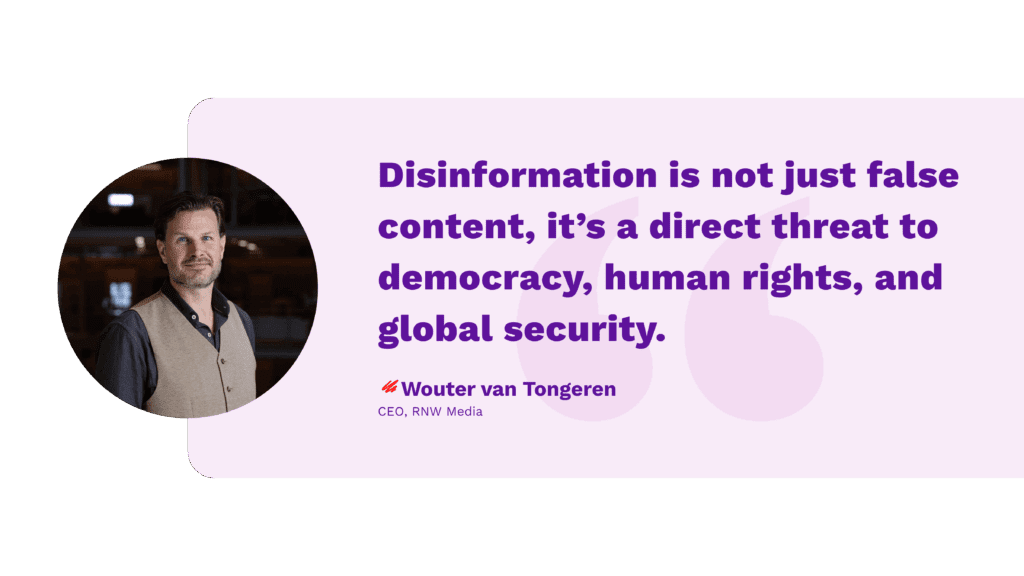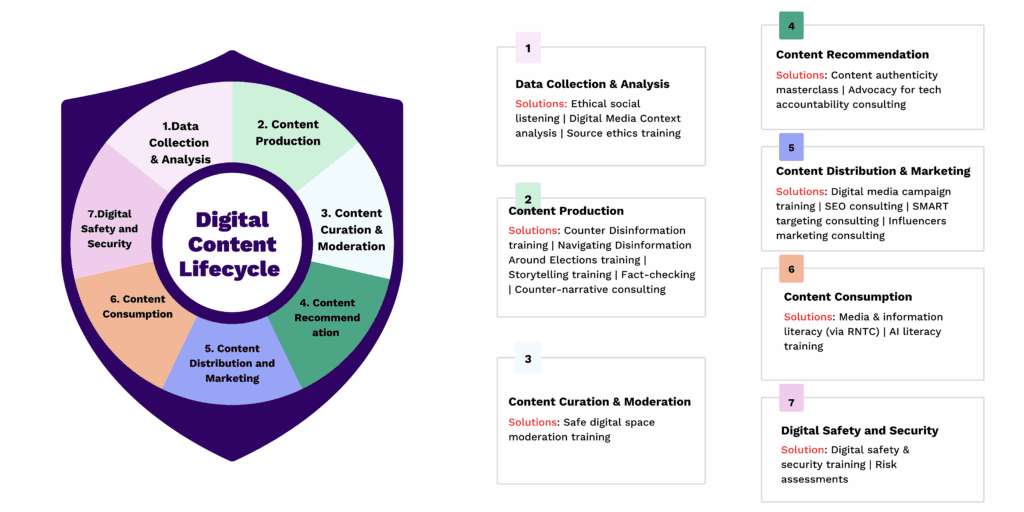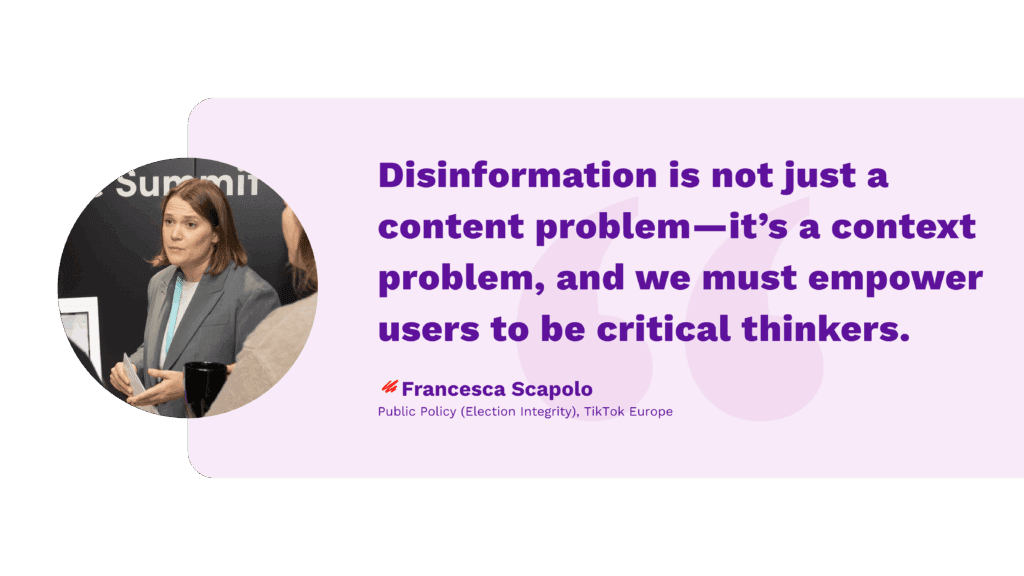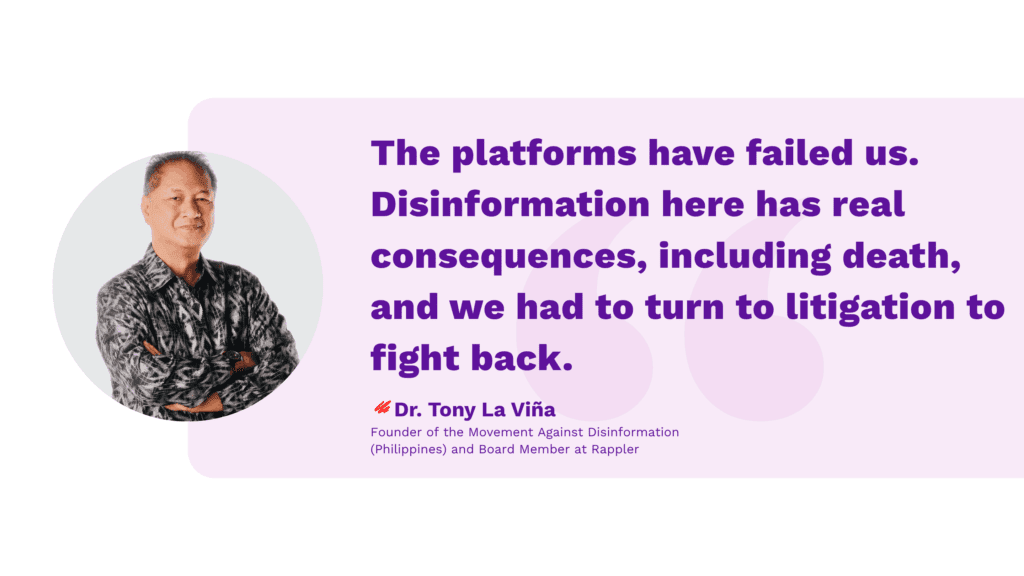- Series I | Tackling Disinformation as a Threat to Democracy, Human Rights and Security – with Truth Shield 360°
Under the theme “Tackling Disinformation as a Threat to Democracy, Human Rights and Security – with Truth Shield 360°,” RNW Media hosted the first series of the Digital Media Impact Summit (DMIS 2025) virtually on July 21.
If you missed DMIS 2025, you didn’t just miss a session, you missed a movement.
Don’t worry! RNW Media is organising two more series in the coming months, so keep an eye out.
From war zones to election cycles, from youth-led media to AI-powered detection tools—DMIS 2025 showcased the bold, creative, and often dangerous work of those on the frontlines of truth. Here’s a roundup of what stood out and why it matters:
A Global Threat with Local Faces
RNW Media’s CEO, Wouter van Tongeren, kicked off the summit with a powerful message:

From the war in Ukraine to conflict in Gaza, from youth in West Africa to women in politics, disinformation is shaping public opinion, silencing civil society, and undermining trust.
The Launch of Truth Shield 360°
A major highlight of the summit was the launch of Truth Shield 360°, RNW Media’s new six-pillar framework for countering disinformation:
- Building Evidence: understanding the disinformation landscape
- Amplifying Truth: Strengthening independent journalism & media partnership
- Strengthening Resilience: Pre-bunking disinformation with and for youth and local community
- Countering Falsehoods: Exposing disinformation with fact-checking and investigative journalism
- Reshaping Narrative: Crafting a truth-based alternative narrative that resonates with the audience
- Rebooting System: Advocating tech platforms’ transparency and accountability
Truth Shield 360° is a global initiative spearheaded by RNW Media and partners to counter the growing threat of disinformation to the connective tissues within societies, and access to information as a public good.

The initiative is a comprehensive framework to tackle disinformation across the entire digital media content lifecycle, through six interconnected pillars for lasting impact, based on multistakeholder involvement for Collective Action.
Panel Highlights: From Policy to Platform
DMIS 2025’s main panel discussion brought together experts from UNESCO, TikTok, the Netherlands Ministry of Foreign Affairs, Tech for Peace, and the Movement Against Disinformation.

Key insights included:
- West Africa: Senior Policy Officer of the Ministry of Foreign Affairs, Benjamin Duerr, emphasised disinformation as a threat to democratic stability, with 200,000+ false messages reported in Ivory Coast ahead of elections.
- MENA Region: Tech for Peace’s Aws Al-Saadi shared how tech platforms’ withdrawal of third-party fact-checking funding has disproportionately hurt media ecosystems in over 20 countries.
- Philippines: Dr. Tony La Viña, Founder of the Movement Against Disinformation, exposed how disinformation campaigns, often targeting women, have distorted both political legacy and justice, with platforms failing to act in time.

- TikTok’s Perspective: Francesca Scapolo from TikTok emphasised their election integrity efforts, including real-time misinformation detection, rapid content flagging, and the banning of political ads.
- UNESCO: Samrita Menon from UNESCO explained how media and information literacy (MIL), integrated in schools and communities, is a long-term antidote to misinformation.
Lightning Talks: Stories from the Frontlines
From Cuba to Mali, Iraq to Palestine, the lightning talks were deeply moving, and at times chilling.
- Iraq: Salam Omer from the Independent media outlet KirkukNow, shared how conflict-sensitive journalism is their daily strategy to pre-bunk, debunk, and rebalance disinformation.
- Cuba: Jose Jasan Nieves (El Toque) introduced De Facto 2.0, a fact-checking ecosystem with an AI-powered app and chatbot, tackling state-backed disinformation.
- Mali: Abdoulaye Guindo, President of Benbere shared how WhatsApp groups are being used to spread falsehoods, so they launched a youth-driven community-led media literacy campaign in local languages.
- Palestine: Taysir Mathlouthi from 7amleh revealed AI-powered system monitoring Hebrew and Arabic disinformation, submitting thousands of takedown requests to tech platforms.
The Tension Between Truth and Free Expression
One recurring theme throughout the summit was this critical tension: How do we fight disinformation without silencing legitimate expression?
Speakers from UNESCO and RNW Media emphasised the importance of:
- Supporting independent public interest media
- Using context-sensitive regulation
- Investing in civic digital literacy rather than top-down censorship
See You at Our Next Session!
What DMIS 2025 made clear is that the fight for information integrity is not about policing content, rather empowering communities, amplifying truth, and holding systems accountable.
If you missed the first session, you can join our next one on September 17th! Stay tuned for more details to come!
